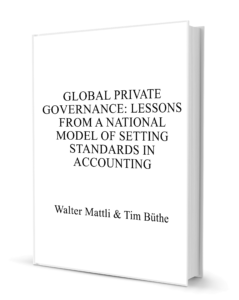
Walter Mattli & Tim Büthe
Read PDFRead PDFWe seek to contribute to this timely debate by presenting a positive political analysis of global governance, both theoretically and in a particular empirical context. Such a positive analysis, we submit, should precede deliberation about which administrative norms and mechanisms can and should be instituted, because a discussion of effective remedies presupposes a clear understanding of actual deficiencies and their causes. To gain such an understanding, we ask a series of analytical questions: Why is rulemaking authority implicitly granted or explicitly delegated to an international or transnational body? What are the consequences of such a delegation of authority for the domestic and international distribution of power and resources (including information and expertise)? Why do some actors rather than others supply such governance? Do all those who are affected in a given realm have a voice in the governance institution (and if not, why not)? And what are the prospects for the comprehensive adoption and the likely effectiveness of administrative law procedures?



